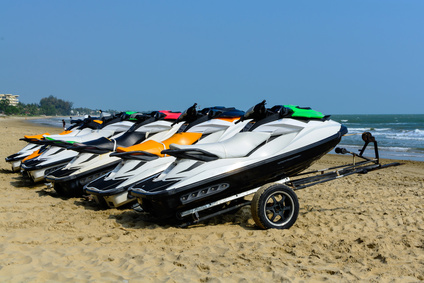5 Things to Consider When Starting a Jet Ski Rental Business

A Jet ski rental business has fairly humble prerequisites, as to get started, all you need is a coastal location that attracts people, the understanding of a jet ski’s operation and maintenance, and of course, some reliable jet skis. When you start digging deeper, however, you realize that there are some small challenges that you have to overcome in your quest to start the business, such as obtaining an appropriate business license. If you feel you can run this type of business, this brief gives you information on some of the basics and how to keep your startup costs low.

- Not all Open Water Bodies are Conducive Waterways
Not all places have potential for good returns when it comes to a Jet Ski business. Firstly, you need to find a location that is conducive to your enterprise. The key to finding a great location for Ski rentals is locating a place characterized by a surge in tourists, and where water sports are in high demand. While some water bodies are unfavorable for water sports, some are protected by federal and environmental laws. It is important to explore your local geography and get acquainted with local, regional, and environmental laws before investing yourself in any specific location. Even if your shortlisted area has its share of water sports machinery for rent, it is still wise to cross check with laws and regulations in that area. - Consider Investing in Salvage Jet skis
Setting up a Jet Ski rental business is an expensive endeavor, as you need a startup fleet of jet skis. They are expensive to buy, run, repair, and maintain. To get you started and ensure that you don’t overshoot your budget, you can go for salvage Jet Skis for sale. The cost of brand new Jet Skis ranges from $2,500 to $10,000, depending on the make and model, whereas a salvage Jet Ski for sale can cost half that much. You also need to invest a little cash towards repairs and touch-ups to ensure the equipment works perfectly. - Seek the Right Insurance Coverage
Accidents and glitches are commonplace in any ski rental business, and therefore, it is essential to have a comprehensive insurance plan in place, covering all your equipment. Also, it is advisable to partner with an insurance provider ready to provide short term rider insurance cover. When you apply for any insurance, you are expected to have at least some experience in the industry. As most insurers don’t provide any insurance cover if you don’t have at least 36 months of industry experience. To prevent any such hurdles, consider taking up a job in another jet ski rental agency so that you can learn the ins and outs of what it’s like to take care of the equipment and provide a safe water sport experience. - Factor in all Overhead Costs
There are three primary costs that are often overlooked when calculating the total overhead costs of a jet ski rental business, such as:
Storage Cost
When operating a jet ski business, it is obvious that you would require space to store your jet ski’s when they are not in use. Keeping them behind a fenced facility really works, but real estate close to water bodies can be expensive. Don’t forget to include this land cost into your overall costs of running the business.
Fuel Cost
Although you can charge customers for the fuel cost, fuel prices are always changing. It is likely that one day you would be making money due to low fuel price but losing it with sudden increase in the price. This is another important factor you must consider when calculating total business overheads.
Maintenance Cost
Different jet skis have different lifespans, and if you are purchasing salvage jet skis, they may require frequent maintenance. It is important to include maintenance costs in your overheads. If possible, try to keep a contingency fund to meet unprecedented requirements for capital investments during business operations.
- Know the Right Time to do Business
As jet skiing is a water based sport, it is inherent that not all days will be business as usual. Part of your responsibility towards the safety of your clients is to know when to close shop and wait for the best time. In addition, you need a demarcation line in the waters and advise your clients on the distance they can travel and where it becomes dangerous to continue skiing if you have crossed the line.
Starting a Jet Ski Rental Business
1. Create a Business Plan
Starting a jet ski rental business requires a good business plan. This plan is really important because it serves as the foundation for your business. This plan covers every aspect of your operations. A comprehensive plan outlines your business objectives, target market, and the strategies you’ll use to attract customers and generate revenue.
When creating your business plan, you should focus on defining your unique selling points (USPs). In other words, what sets your jet ski rental service apart from competitors? Perhaps it’s the quality of your jet skis, the convenience of your location, or possibly the exceptional customer service you plan to offer.
You should also include a detailed analysis of your target market, identifying potential customers and their needs. This will help tailor services that meet the customer expectations, enhancing customer satisfaction and boosting your business’s reputation.
Financial projections are another important component of your business plan. You should estimate your startup costs, including the purchase of jet skis, insurance, and legal fees. In these projections, you should outline your pricing strategy, considering factors like peak seasons, customer demand, and competitive pricing. A well-thought-out financial plan will guide your spending and help you secure funding if necessary.
Your business plan should also come with a marketing strategy. In other words, how will you attract customers to your jet ski rental business? Will you rely on social media, local advertising, or partnerships with hotels and resorts? A strong marketing plan will ensure your business gains visibility and attracts a steady stream of customers.
2. Legal Issues for This Business
Knowing the legal landscape is also pretty important when starting a jet ski rental business. First, you need to register your business with the appropriate authorities and obtain all of the necessary licenses and permits. This can take a while. But this step ensures that your business operates legally and avoids potential fines or shutdowns.
Insurance is another key legal consideration. Given the nature of the business, having comprehensive insurance coverage is really important. This includes liability insurance to protect against customer injuries, as well as equipment coverage for your jet skis. Working with an insurance agent experienced in the rental industry can help you pick the right policies.
In addition, you’ll need to draft some legal documents. These include rental agreements and waivers. These documents should clearly outline the terms of service, including rental duration, customer responsibilities, and liability waivers. It’s important to consult with a legal professional to make sure that these documents are watertight and comply with local laws.
Understanding local regulations related to watercraft is also important. This includes obeying safety standards, keeping your jet skis in good condition, and ensuring your customers receive proper safety instructions. Non-compliance with these legal requirements can result in severe penalties for you. So staying informed and compliant with the laws is key to running a successful business.
3. Organization and Management Issues for This Business
Effective organization and management are crucial to the success of your jet ski rental business. You should start by determining the structure of your business. So, what does this mean?
Well, will you operate as a sole proprietor, a partnership, or a corporation? Each type of business structure has its own legal and tax implications. So choose the one that best suits your business plan and goals.
Staffing is also a very important consideration. Depending on the size of your business, you may need to hire employees to manage customer service, equipment maintenance, and other important tasks. It’s essential to provide the staff with training, especially in safety protocols and customer interactions. Well-trained staff will boost your business’s reputation and ensure that your customers have a positive experience.
Since you run a business, you will have an inventory. So, inventory management is also important. You have to keep track of your jet skis, life jackets, and other equipment, and make sure that everything is in good working order. Regular maintenance and inspections are necessary to prevent accidents and extend the lifespan of your equipment. Having an organized inventory system will help you monitor usage, schedule maintenance, and reorder supplies as needed.
Customer service should be a top priority in your management strategy. You need to establish clear procedures for handling reservations, inquiries, and complaints. A smooth and responsive customer service process will lead to satisfied customers and positive reviews. You have to consider implementing a modern booking system that allows customers to make a reservation of jet skis online, making the process more convenient for them.
Finally, consider a growth plan. As your business expands, you may need to invest in additional equipment, hire more people, or open new locations. Having a flexible management strategy that can adapt to growth will help you scale your business successfully.
The Bottom Line
Some people think that setting up a ski rental business entails simply purchasing ski boats and putting them up for rent. A lot of groundwork is required, ranging from finding the right location to scouring the market for affordable equipment, among others. You need to educate your clients on various safety requirements and proper handling of the boat during skiing to avoid loss of life and limb as well as damage to your equipment. When starting a ski rental business, you need to secure a number of work permits including local and regional permits to operate. In addition, you are likely to need a sales tax license and a proper insurance cover to safeguard your business in the event of mishaps or legal woes.
- Buying Salvage Cars: What to Expect on Auction Day - May 22, 2025
- Is Buying a Hail Damage Car Worth It? A Detailed Guide - December 2, 2024
- Affordable Luxury: The Best Budget Luxury Cars for Families in 2024 - November 21, 2024